Too often, we’re told that our individual actions are too small to make a difference in the face of global challenges like climate collapse and late-stage capitalism. While there's truth to this, I believe we are still called to individual action to participate in what Joanna Macy calls “the Great Turning”—a shift toward a more just and sustainable world.
At first glance, the impact of individual actions may not seem significant. One person is unlikely to stop big oil from drilling, or to enact policies like universal basic income. On a global scale, it can feel as though our efforts barely register.
Yet, the importance of individual actions cannot be underestimated. After all, a waterfall begins with a single drop. Then another. And a few more. The changes we make in our own lives first shift our mindset, and as that change ripples out, it can contribute to broader cultural or societal transformation.
Many people I know began questioning colonialism and capitalism because they wanted to change how they were living in the world. They asked themselves: If this isn’t working, what will? And from that question emerges the search for new, more sustainable ways of being.
This episode's guest, Anna Hewitt, embarked on her own journey with a similar question: What can I do to make a difference? In our conversation, Anna shares how she became a maker—a DIYer—and how this shift has transformed her life. Making is magic! It’s grounding, connecting, and often stands in direct opposition to the forces of capitalism that prioritize efficiency and profit over people. Making invites us to slow down, connect with raw materials, and create something new, whether by shaping, growing, or baking.
If you’re keen to read more, you can find Anna on Instagram at @annaghewitt and Anna also has a substack you can subscribe to below:
You can support this project and podcast by becoming a paid subscriber here on Substack.
If you have a person or project who you think is doing really awesome work in their community, please recommend them by emailing me at kel@novitasmag.com.
TRANSCRIPT (please excuse the typos)
Intro: Welcome to Novitas, a podcast that explores stories and ideas outside the capitalist paradigm. My guest today is Anna Hewitt, a writer, mother and maker who shares her thoughts and stories online about, well, living life. Anna feels a bit like a kindred spirit, another human being out there in the world, learning and sharing how best to live life in a way that has intention and meaning without contributing to systems that we know to be harmful. Anna's story that she shared in the first issue of the Novitas magazine is about the magic of making, about using creativity as a tool to connect with the world and how DIY can help us act with intention.
In this episode of the podcast, we talk about how this lifestyle doesn't always make sense within the parameters of capitalism, and why making space for creative practice in the everyday can actually be an act of resistance. I hope you'll enjoy the conversation.
Kel: Hello, Anna. Thank you so much for joining me today to chat about your piece in the first issue of the Novatos magazine, which is sadly sold out now. But we're prepping for number two, so I'm excited for that one. I guess we could start a little bit. Do you want to talk a little bit about your piece and what kind of inspired you to write it or contribute that topic in particular?
Anna: Sure. Um, yeah, so I think the piece that I wrote is pretty representative of what I often try to put out in the world, which is the power and of just making and engaging in the world in a kind of physical way by doing things hands-on. I think I wrote about things like baking and the things I do are sort of home-based. Like I have a big garden, I preserve food, I bake, I sew. And it doesn't have to be those things but just the way that we can interact with the world through making and the way that hand making by hand and kind of slowing down to do that is a little bit a small way of disrupting the more common cycle of consumption, I guess.
Kel: Right, yeah. So specifically around like creativity and like being a maker, I guess they say. How did that come to be kind of a central role in your life?
Anna: I think it's been part of my life forever. I have a lot of memories of trying to build a table as a kid or like trying to make pants from patchworks. And then I got gain skills and I was able to be able to do it without as much with better results, I guess. Um, so it's just something that is part of my life. I did, um, I went to college and studied art, but then I kind of pivoted towards, I think I just really liked having creativity integrated into every day. So, and for me, like cooking dinner maybe for a lot of people does not feel creative, but I actually love that time to maybe have a little time to myself and just prepare food. And it feels nourishing to me. I've just been lucky, I guess, to be able to incorporate a lot of making and growing things into everyday life.
Kel: Yeah, that's cool. I mean, I wish I thought it's a beautiful way to think about making dinner. Sometimes I think the hardest part about adulting is the fact that you have to make dinner every night. But it is true and it's also been kind of an inspiration for me too as I've explored more about how to eat locally and source local food is that shopping for food becomes my shopping in the way that other people shop for clothes or gadgets or whatever. It becomes the way that I get to spend money in this really cool way and then, yeah, like craft something and experience and it is time for yourself kind of that you that you have to schedule for yourself. So that's a very cool way of thinking about it. What other kind of creative practice you mentioned like sewing and I know you're your homeschool parent as well.
Anna: I am Yeah.
Kel: Does this trickle down into your homeschool practices then as well?
Anna: It does. And I just want to say it's not like I love making dinner every night like my kids make it feel very challenging to me, but when I can take the time and when I can enjoy it, I do really like it.
Kel: Mindfulness practice, right?
Anna: Yeah, it comes and goes, of course, and sometimes it's very difficult to even want to make dinner. But yes, I am like sporadically sew things. You know, I do love things like quilting, like hand stitching. I knit a little bit, but just even having a project to kind of the go to keep that regular making going. So, you know, working on something while my kids are doing something else, or we also do dual projects. We used to do a lot more when they were younger, and now they kind of want to do their own thing, but like right now we're making Halloween costumes together, depending on their interests, like they'll join me in making jam or baking cookies or whatever. And I know those are all really small things, but that just, to me, that really is creativity, even if it's not like, inventing something brand new or like I think just the small like things like that do matter.
Kel: Yeah for sure and I think that came across in your piece as well like integrating those everyday moments and taking time to say like uh with intentionality saying this is the way that we're going to incorporate creativity into our everyday lives not see it as something separate or something that we have to schedule time for but just incorporating it into day-to-day activities. I know that a lot of people who have this kind of creative streak within them or choose to be very intentional makers struggle with the idea of making their projects into like a side hustle or You know Monetizing it. That's the word I'm looking for. Do you struggle with that as well?
Anna: Um, I Think I just never succeeded in that area. Like I think if I think I have to say like, okay being home with my kids, like part of that, I'll be able to have like a creative business of some kind. So there is always that temptation. Maybe there's a balance that can be found. I don't, yeah, I think it's important to realize, especially nowadays, or side hustles are very publicized, I guess, to kind of say like not everything has to be, doesn't have to have a purpose. Like I was actually recently writing about sort of taking this further, like a lot of the creative work that I do has a purpose, like I'm making food or I don't know, making a quilt or a piece of clothing. But sometimes I think it's also great to just do something that really has no purpose, but it's creative. I'm like, you're never going to put it on your wall. You're never going to, might never even show it to anybody. It might not build your skills, but it's still, it's kind of like childlike creativity, I guess, where a lot of younger people aren't thinking I'm going to make this so I can sell it, or I'm going to make this so I can share it on Instagram or whatever. So I think there's value in that too.
Kel: Yeah, and it ties into this idea of what it means to be productive. I actually, I struggle with this a lot because I do publish things online, right? And so it's hard when I'm doing a drawing or creating something. It's like, what is the intention? Can I just sit with this object that I've created and not have any kind of like future purpose for it? Can the purpose just be this object rather than am I going to sell it? Am I going to publish it online? Is it going to get lots of likes on Instagram? That kind of thing, right?
Anna: Yeah.
Kel: And there's a there's a piece in there for me that ties into like productivity. And I think sometimes I can only justify creative practice when it contributes to that idea of it being productive, a productive use of my time. And then of course, that gets tied into profitability as well. So I guess, a question in there is what does it mean to be productive for you? And how does that shape your like day to day creative practice as well?
Anna: That's an interesting question, because I do think about this a lot, especially because I don't do any paid work at the moment. And it's not that I don't want to, but and I think that's a piece that's interesting to think about, because there's a lot of pressure to, obviously, there's financial reasons, but also just, you know, everybody else is writing and has a lot of subscribers to their substack or and there's so much that we see all the time if we're watching and maybe it's better not to but... So sometimes I think about the word fulfillment and how I think there's a lot of times in my life where I've been like, have I been productive today? But thinking more like, and it's a luxury to be able to consider whether you're fulfilled, but to think about like, is what I'm doing how I wanna spend my time. And we don't always have a choice about that, but especially if you're thinking about the small things that you can do within the time that you're spending in your day, can some of those be maybe more fulfilling? Like you're talking about the way that you shop. And that's not always an option, but it can be a nice way to think of things.
Kel: Yeah, for sure. And I think there is that distinction too, right? Like, for people who have to spend their time selling their labor in order to have their basic needs met, sometimes the the priority of personal fulfillment doesn't become an option. But there is often for most of us, those moments in our days where we can sit down in front of a TV and, you know, consume media and there's nothing wrong with that. But is there a way that I can feel more fulfilled with my time and often creative practice then like kind of slides in there, right?
Anna: Yes, and sometimes it's like knitting while you watch a show, you know, like that's okay too.
Kel: For sure. I remember when I started doing more DIY stuff, it was like I was really interested in the zero waste movement. And I think that was a big catalyst for me. Um, because you get, you get pulled into like in your day to day life, there's a lot of like consumerism and packaging and capitalism influencing how we consume things. And I think when I was really getting into that zero waste stuff, I realized that there, I had a desire to have stuff with less packaging and get stuff from closer to its source. And so like just the idea of my life being a little bit more sustainable, I guess, and relying less on consumer goods played a huge role into why I started making stuff from scratch. Did you have a similar path through like consumerism or did you find that there was different motivations from the outset for you?
Anna: Um, I think that's definitely a piece of it. I have also explored kind of lower waste and I actually have done a bunch of different projects based on like reusing and turning something into something else. And then I feel like maybe it's not, doesn't always feel creative, but it's kind of like a shift in the way that you think about maybe what you're buying or how you're buying it. Which can, if that's something that's important to you, like it can feel maybe a little bit more fulfilling to make choices that are less wasteful and that, and that does lead to some creative thinking and creative problem solving sometimes too.
Kel: You talked a little bit at the beginning about how creativity and, you know, making things for yourself also, there's a, there's a piece in there about slowing down. And I guess there's something beautiful that happens when we kind of embrace DIY lifestyle around slowing down, where we can use our time to like make and create things rather than existing in this kind of transactional relationships with goods and products that we require in order to have our needs met and like baking bread instead of buying it or making room for creative practice, maybe with our kids. Obviously these aren't like efficient ways of doing things. They take time and they kind of force us to slow down. And in that way, I guess DIY culture becomes something bigger than just like crafting or up cycling. Can you talk a bit about those kinds of intentions behind your DIY practice?
Anna: Yeah. I mean, I think it's a combination of a lot of things. Like it can be a choice to like, okay, I could buy this, but I want to make it myself because it feels more creative or I don't want to spend the money or let's see how it turns out. And I don't know, I think a lot of like hand stitching things is often feels to me like very meditative and a time to kind of be slower. It doesn't necessarily mean that I'm taking hours to do it or I'm doing it in absolute silence or anything like that. But it's just one particular creative process that feels relaxing and nourishing in some way to me. I also kind of feel like when I talk about it, I feel like in some ways there's this idea of slowing down with all of these things and it doesn't necessarily always feel like that in practice because you know you're timing the bread baking with this call or whatever it is. So it's like more fulfilling to be involved and I guess another piece that I talk about a lot with making things is that it's kind of like a way of connecting with the world around me. And that feels, I don't know if it's slower or what, it's different than when you go into a store, grab something, pay for it and leave. And it's even more than that. It's like, I'm planting this seed in the soil and in a way, like I'm a little tiny piece of that process.
Kel: Yeah. And so there is this kind of, um, like almost alchemical process that happens when you start with ingredients or start with the, you know, scrap pieces of fabric and end up with something where you can see how it's created and you can see where it came from and you can see how all the pieces came together. And when you go to a store and buy that thing, you don't experience that at all, right?
Anna: Yes. And I love being part of like this transformational process. You start with a bunch of random things that don't seem like they're going to be anything or you know they will, but you know, and then it becomes something else. And even though like you've baked hundreds of loaves of bread, like it's still kind of magical that you get to facilitate that process.
Kel: Yeah, I'm still like shocked often when I take it and I'm like, it's just flour and water. It's just flour and a little bit of salt, but it tastes so good.
Break: You're listening to the Novitas podcast with my guest Anna Hewitt, and we're exploring what it means to be a maker inside a system that tells us that making things we need for ourselves is often inefficient. Anna wrote a wonderful piece for the first issue of the Novitas magazine, which is now sold out, but we are just about to launch presales for the next issue. If you're interested in ordering a copy, you can find out how on our website at Novitasmag.com or over on Instagram at @NovitasMag. Now back to the conversation.
Kel: Yes, I very much resonate with that kind of experience. And I also really resonate with the process, the hand stitching, because I'm currently getting prepped for a couple of pop-up markets, and I'm making these patches. And it's funny because it's this really kind of slow process. And I know I'm not going to sell the patches for very much. They're probably going to be a couple bucks. And they take me a couple of hours to make. So like an hour doesn't compute at all. Right? In there like the math of capitalism just doesn't apply anymore. But there is other ways that I am fulfilled by the act of creating this patch, right? Where it is I'm taking time for myself and slowing down and experiencing that magic of creativity. So even though it doesn't pay off in dollars, it pays off in other ways.
Anna: Yeah, and I think also making something that you put out into the world, like you don't, that's not necessary, but there is that's another piece where maybe someone's buying it and you're not making as much money as would make sense for dollars per hour or whatever, but you're then putting it out to other people and that I do feel like it's meaningful to put it out there. Like I write my substack newsletter and don't really hear back from people much, but I still value being able to like reach people in a small way.
Kel: For sure. And that There's a piece in there for sure about the content creation going into the void, but I'll let you keep going.
Anna: Yeah. You know, it doesn't always make sense to do something that reaches other people that they that you don't get a lot back. But but sometimes I think that can be an important aspect of creativity for some of us.
Kel: Yeah, it's and it's hard because those motivations come from outside our capitalist paradigm that we exist in. Right. So you and you have like it's healthy to find those motivations. It's not something where it's like I have to feel embarrassed or I have to, you know, make excuses about why this is still worth my time.
Anna: Right, right.
Kel: Because it is personally fulfilling. And that's, that's kind of, that's all you need. That should be all we need. How is your experience? Tell me a little bit about your substack. I mean, we can trade horror stories.
Anna: No, I just, most weeks I try to write an essay and I've been doing it for about a year. And it's actually, I've learned so much as a, and I feel like I've learned more about myself as a writer and so that's been really worthwhile. And it does feel, yeah, it's an interesting thing because there's, I don't know if this is like a modern social media age thing where it kind of feels good to like broadcast something to whoever happens to see it, or if it's just we live in less integrated societies so we're not having as many opportunities to interact with people and tell them things that matter to us. I don't know. But there is something, some part of me wants to be able to put something out. Nothing else has really stuck.
Kel: I can fully validate this experience. I have tried like journaling, getting a blog, and it really doesn't have the same effect. It's like, what goes out into the world, there's this kind of like, oh, it's done. Right?
Anna: Yeah.
Kel: Something exists in private or unpublished or just for myself, it doesn't feel this, I don't get that like, okay, it's done now. And I don't know, you're right, maybe it is just the like deep desire that we have to communicate with other people and knowing that there's people that are reading it on the other end and that are consuming it, makes it feel more complete for me, I'm not sure, but there's definitely some.
Anna: Obviously, there's something about it where we all like putting our opinions or our experiences out there. And you know, I guess people like painted on caves and yeah, they didn't just draw it in dirt so it would wash away.
Kel: Something more permanent out there. And I do find that like note and I'm totally going off topic here. But like, I find often when I am intentional about my social media usage, a lot of the times that I reach for my phone, I'm actually looking to connect with people. There's a genuine desire in there to be around other people to be communicative with other people to have I like more than transactional relationships with people. And I think social media does a piss poor job of filling that need. But sometimes it's all we have.
Anna: Yeah. Yeah.
Kel: But the cool thing about it is that we do get to connect across time and space in a way that we couldn't before. And we do get to share knowledge and information and resources and ideas in a way that we've never been able to do before. And I think there's real power there. I was talking with another friend about reclaiming social media. Again, you have to switch your motivations and your intentions because your stuff might get lost in the algorithm or it might not reach a wide audience in the way that you want it to. But reclaiming it and saying, this is my space and I'm making it for me and screw your algorithm. I don't care if you like what I'm posting or not. And then, you know the people that you do connect with, those connections feel a bit more genuine to me. I don't know.
Anna: Yeah, that makes sense.
Kel: What kind of stuff have you been writing about on your substack?
Anna: Yeah, I kind of write about tangentially like creativity, seasonal living, some unschooling, just mostly it feels like I'm kind of writing about what's what I'm interested in and I feel like sharing and people enjoy it and that's kind of what I'm doing.
Kel: Yeah, that's awesome. One of the reasons that I started posting on Instagram way, way, way back when because a good friend of mine who is also on the podcast, Helen Tremethick, told me that people need to see examples of how to live differently. And I think that is valid when we often get lost in the how many people are subscribed to my substack or how many people like my post. Just even providing a countercultural option for people, for permission to say like, it's okay to slow down. It's okay to do things in an inefficient way, because it's more fulfilling. It's okay to, you know, take a break from the rat race and maybe try something different. So I think the more people that are out there sharing the way that they're doing things in countercultural ways is really good.
Anna: Yeah, I think I've been able to learn from a lot of people reading and seeing social media. And it reminds me of like, back, I don't know, 20 years ago, I still was like baking bread and making things. I was living with some other people and that, and I just remember feeling some satisfaction that like I was doing that. And then they were interested in trying some of those things. That was the old way, I guess, of spreading. Yeah.
Kel: I mean, I hope we get back there at some point where I feel like maybe people are creating more in-person interaction rather than just online interaction, maybe coming out of the pandemic.
Anna: Yeah, I just wanted to say like the creative stuff that I do is for me, but it matters enough to me that like I want other people to see that it's an option or that it might work for them too.
Kel: Yeah, for sure. And I think one of the pieces that came out of your magazine that I really resonated with was like you don't have to be really good at something or have a product that's marketable in order to consider yourself an artist or a creative person, right?
Anna: Yes, I'm actually not the best at all the things I do. I like to just, I don't like to follow patterns and I don't always follow recipes, so I do it and sometimes have to redo it. But I still, you know, and I've also been telling myself I should try a little harder to get better at it, but it's just it's something that I enjoy. And so if I do it the way that I like to do it, that's part of the process. I guess
Kel: For sure. And I guess for anybody listening, this is permission for you to like do things poorly. It still counts as creativity.
Anna: Yes. I think that's really important because people are like, I'm not creative or, you know, there's a lot of perfectionism that gets in people's way and it's okay to bake way too much bread and then it explodes over the pan and gets burned. But my kids still ate it. You know, you have to start somewhere and eventually, if nothing else, you become more comfortable with the process and you might still make mistakes, but it's okay because you know you can try again.
Kel: Yeah. I'm also not a recipe follower and my family will attest to this. Like, my pancakes are hit and miss. Um, I am not very good at cooking. Like it's not something that comes naturally to me at all. Um, but I did find that when I started getting interested in local and sustainable food, you just kind of like have to keep going and like through the blenders and through the things that don't taste good, just practice. And as like the years go on, kind of, you find the pieces that work for you or the processes that work for you or the recipes that work for you or the patterns or whatever. And, uh, And there's a natural aptitude that just builds over time, even if you're not naturally good at something.
Anna: Yeah, I think that's important because it's easy to feel like you have to be great at something that you wanna try. And you can try other things and creativity, there's some things that will feel really comfortable and some things might not. And you just kind of figure it out over time, like you said.
Kel: Yeah, I really love this thread of like, does it mean that you're not productive if you're failing? And where does that message come from? And who's telling us that, you know, failing is a waste of time? Because I can tell you, my kids are like way bought into this idea that failure is bad and that it's not worth their time if they're not going to be really good at it.
Anna: Yeah
Kel: I love, I love, love, love ways to like break that down with them as well. But I think it is part of our cultural narrative for sure.
Anna: Yeah, definitely. I mean, you don't really hear much about the mediocre bread bakers or whatever.
Kel: Yeah, they don't post those on Instagram.
Anna: It can be frustrating because I feel like it also takes work and energy. And sometimes that is not as abundant as we want it to be. But I do really think like we've been saying, the more you do it, the less difficult it is and then the mistakes don't matter as much.
Kel: Yeah, that's true. In your article, you have a quote from Wendell Berry, who wrote, every day, do something that won't compute. Do you want to talk about the context of that quote a little bit?
Anna: Yeah, I mean, he wrote a poem about it and talking about how basically, all the stuff we've been talking about, step away from what they want you to do and doing all the things that society says and saying that it won't compute to me is like, it's not gonna make you money, it's not gonna bring you fame. I feel like those are the two biggest things that society values. And so when you choose to do something creative, whether or not it's like productive that you're making something you're going to use or it has no purpose, to me that's stepping outside of that framework that feels so prevalent.
Outro: Thanks for listening to this episode of the Novitas Podcast with me, Kel Smith, and my guest Anna Hewitt. If you'd like to learn more about Anna and her writing, you can visit her substack Basil and Honey at annahewitt.substack.com. That's A-N-N-A-H-E-W-I-T-T dot substack dot com. Or you can follow Anna on Instagram at @AnnaGHewitt. If you're interested in supporting this podcast, you can become a paid subscriber over at the Novatas Substack at nova and there's also sliding scale options as low as $12 per year, and I'll include some information in the show notes about how you can subscribe. This podcast is totally unfunded, so it means a lot to have your support. Thanks again for listening.


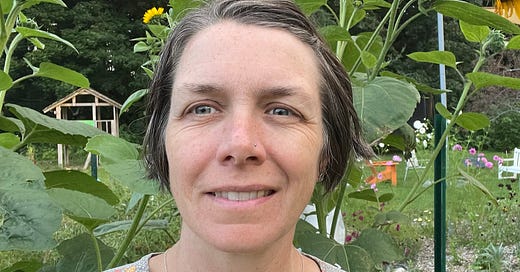




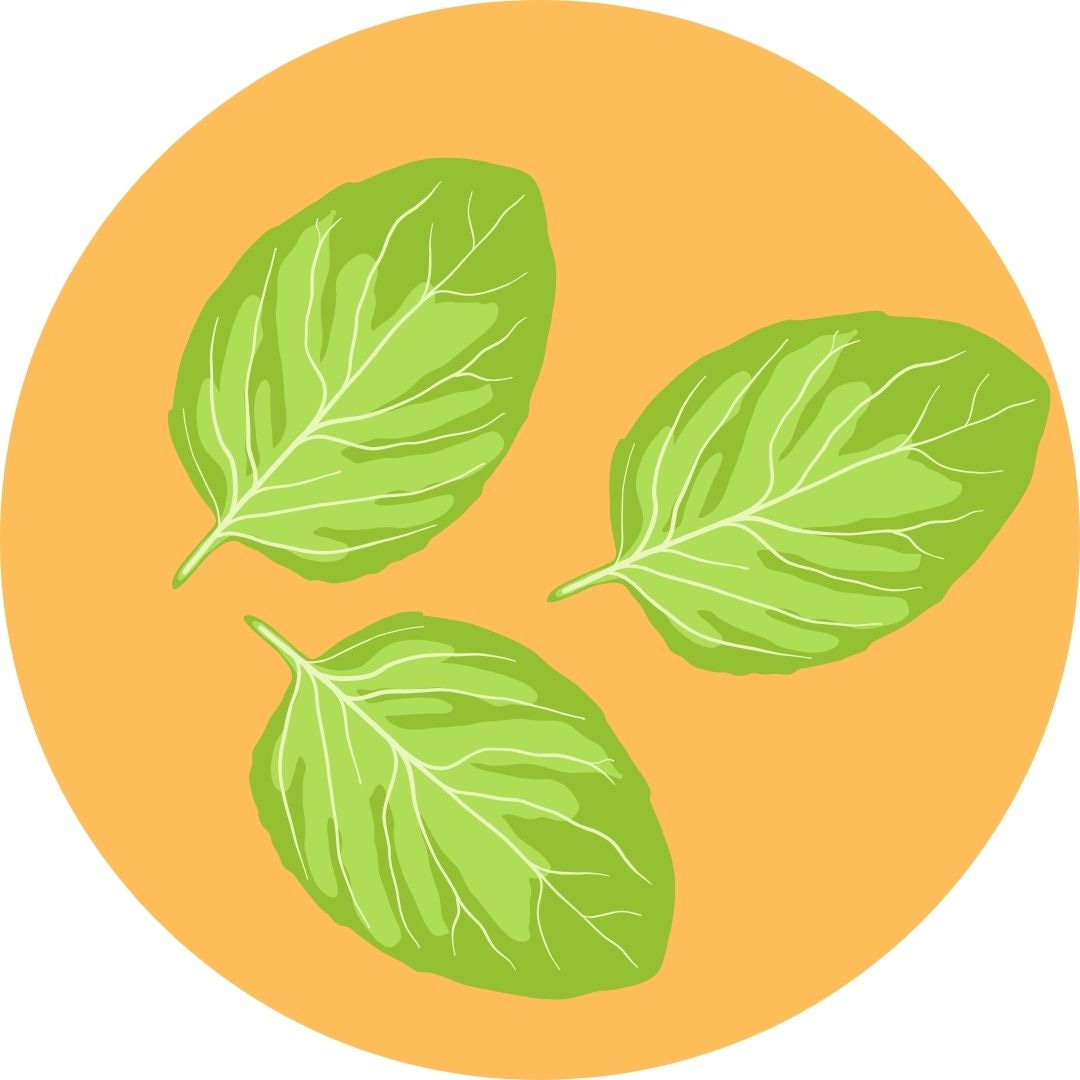


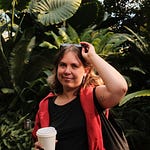

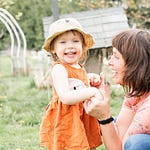
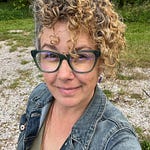


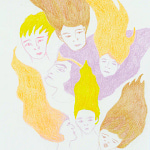
Share this post